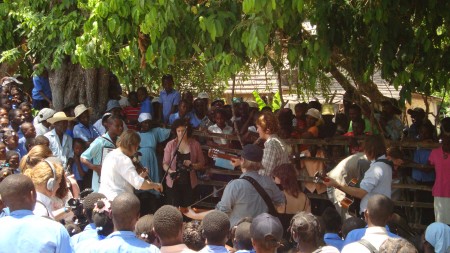Reflektor, the new album by Arcade Fire, takes its influence from a source that might seem surprising at first glance: Haitian music. For those who don't know, the Canadian indie rock group is one of the most popular and acclaimed in the world. Their previous album, The Suburbs won them a Grammy for Best Album, and their latest album features contributions from David Bowie and LCD Soundsystem’s James Murphy. While the theme of The Suburbs-- North American suburban coming-of-age-- was a far cry from the culture reflected in Haitian rara and vodou, the band does have a natural connection to the Caribbean nation: the parents of the group’s multi-instrumentalist and singer Régine Chassagne are Haitian. In the aftermath of the 2010 earthquake in Haiti, Chassagne and her husband, Win Butler, who is the group's lead singer, traveled to Haiti to help with the relief effort. In an interview with Rolling Stone, Butler said, “Going to Haiti for the first time with Régine was the beginning of a major change in the way that I thought about the world.” There Butler and Chassagne took in the music of the Carnival, rara music, and vodou drumming.
Butler describes “Here Comes the Night Time” as the “most Haitian song on the record,” a mixture of rara and Jamaican music, which the band also took in while spending time at the Trident Castle in Port Antonio, Jamaica. Lyrically, the song also reflects the aftermath of the disaster in Haiti: both the exploding number of evangelical missionaries going to teach about God in country where Butler says, “I’ve never [seen] more belief and more knowledge of God,” and the difficulties faced by Haitian refugees, who fled the country in boats only to be turned away by authorities in the US. The band is now touring with Haitian percussionists in support of the album.
Hopefully, Reflektor will inspire fans of Arcade Fire to learn more about the rich music and culture of Haiti. A strong political undercurrent runs through rara, vodou, and the festivities of Carnival. Rara, which lasts from the Carnival until Easter, is a parade in which musicians, sing, play drums, bamboo horns (vaskin), and tin trumpets. The tradition, which is often used to voice political protest, differs from region to region throughout Haiti, and was originally brought over to the country by slaves from Western and Central Africa. Vodou music, like rara, has its roots in the history of slavery in Haiti. It was used to stand up to slavery, which was overthrown during the Haitian Revolution that began in 1791. Since then, it has been used to insist on radical liberation and to stand up against outsiders. The Carnival, too, has a long history of “point songs”-- political allegories-- used by musicians and revelers to voice opposition to the state of their society and political atmosphere.
At Afropop, we have extensively covered the original Haitian sources that some of the music on Reflektor reflects. On “Music and The Story of Haiti- From Vodou to Compas to Racine to Rara and Beyond,” we explored the history of Haiti’s diverse musical legacy. On our Hip Deep program “After The Quake: Music, Politics, and Spirituality in Haiti,” we traveled to Port-au-Prince in the aftermath of the 2010 disaster and recorded some vodou and music of the Carnival. And in “Big Night in Little Haiti, Miami Style,” we took in the monthly party at Miami’s Little Haiti Cultural Center where Arcade Fire recently played in support of their new album.
Below, check out a video of Rara processions in the Haitian village of Kabic.








